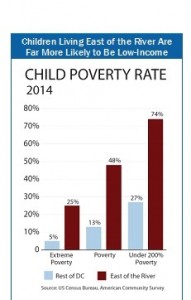When hundreds of people gathered last Thursday for a conference on “Equitable Economic Development East of the River,” organized by City First Foundation, DCFPI shared statistics that remind us of how different life is for residents living there.

- One in four children east of the Anacostia River lives in extreme poverty: That means living on less than $10,000 for a family of three. In the rest of the city, just one in 20 children is in a family with income this low.
- Incomes are falling east of the river: The typical household living east of the Anacostia River has seen its income fall 10 percent since 2007 — to just $32,000. Meanwhile, in the city as a whole, typical household income rose $10,000 during this period, or 16 percent after adjusting for inflation.
We probably all have some vision of what equitable economic development looks like: communities with improving housing conditions and vibrant commercial corridors — where existing residents are able to enjoy the progress. We probably also have some vision of what inequitable economic development looks like: the same kind of housing and retail changes sweeping through a community, but where benefits are left behind by rising costs that prevent them from benefitting.
The challenges facing residents living east of the river are severe but not unique. Many of the strategies to promote equitable development in Ward 7 and Ward 8 will need to address these city-wide problems.
- Housing costs are rising, but incomes are not: Over the past decade, housing costs have risen across the board, from the person looking for a low-cost basement apartment to the person seeking a luxury home. But for the bottom 40 percent of DC households, incomes have not budged, leaving families struggling with the added expenses.
- Wages are falling for residents without a college degree: The typical DC resident with a high school degree earned just $13 an hour in 2014, a decline of almost $2 since 1980, after adjusting for inflation. Residents without a high school degree also have seen wages fall.
These are big challenges with no easy solutions. The City First Foundation conference focused on a variety of needs: housing, jobs, commercial revitalization, and supporting entrepreneurship. There also was a discussion of steps to ensure that the forthcoming 11th Street Bridge Park — which will open opportunities on both sides of the river — leads to economic development that benefits everyone.
The conference sparked a multitude of conversations — during formal sessions and in the hallways — to shape a vision and strategies for ensuring that all DC residents benefit from economic development. We look forward to the next steps from these important conversations.
To print a copy of today’s blog, click here.
